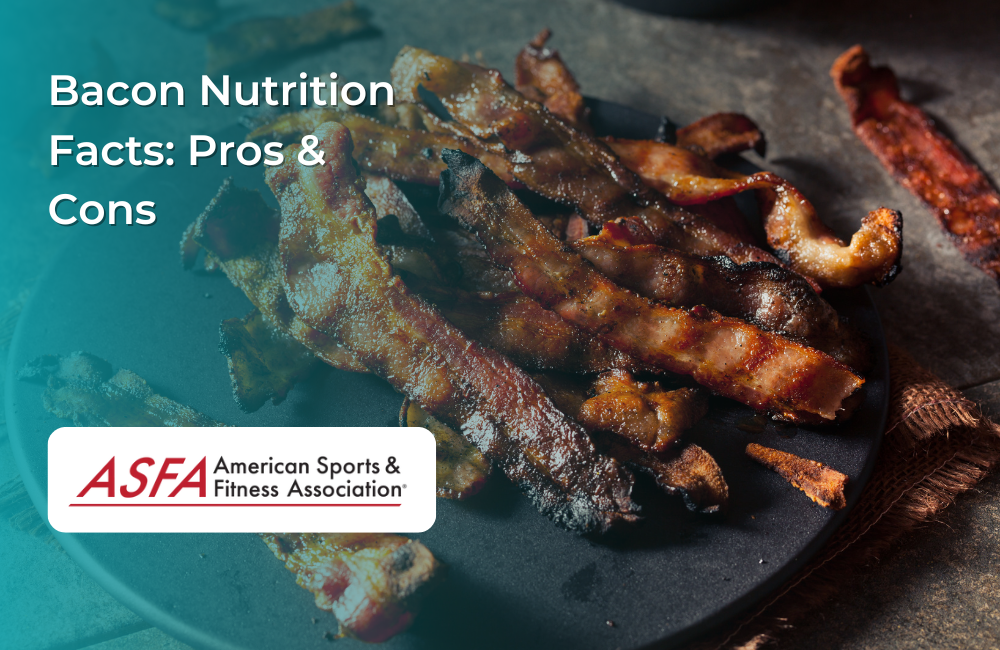Bacon is a popular breakfast food known for its rich flavor and crispy texture. While it provides protein and essential nutrients, it is also high in saturated fat and sodium. Understanding the pros and cons of bacon helps determine how it fits into a balanced diet.
Pros and Cons of Eating Bacon
High in Protein
Bacon contains protein, which supports muscle growth, repair, and overall bodily function. Protein helps maintain satiety, making meals more satisfying.
Source of Essential Nutrients
Bacon provides important vitamins and minerals, including:
-
B Vitamins – Essential for energy metabolism and brain function.
-
Zinc – Supports immune health and wound healing.
-
Iron – Helps transport oxygen in the blood and prevents fatigue.
-
Selenium – Acts as an antioxidant and supports thyroid function.
Turkey bacon has fewer calories compared to regular bacon, but the overall health benefits are still debatable due to similar sodium levels and the presence of additives in both types of bacon.
Provides Healthy Fats in Moderation
Bacon contains monounsaturated fats, which contribute to heart health when consumed in balance with other nutrients. Fats from bacon help with hormone production and brain function. A microwaved slice of turkey bacon has a similar protein content, calorie count, and sodium level compared to pork bacon.
Supports Ketogenic and Low-Carb Diets
Bacon is a high-fat, low-carb food, making it a popular choice for ketogenic and low-carbohydrate diets. It provides energy while keeping carbohydrate intake minimal.
Brain Function and Development
While bacon is often celebrated for its rich flavor and protein content, it’s important to consider its impact on brain function and development. Research has shown that consuming processed meats, including bacon, may be linked to cognitive decline and an increased risk of dementia.
-
A study published in the journal Neurology found that older adults who consumed processed meats like bacon had a higher risk of cognitive decline.
-
Similarly, research in the Journal of Alzheimer’s Disease indicated a connection between eating processed meats and an elevated risk of dementia.
Even turkey bacon, often touted as a healthier alternative to traditional pork bacon, contains processed meat and may pose similar risks to brain health. A study in the journal Nutrients found that processed turkey meat, including turkey bacon, was associated with a higher risk of cognitive decline in older adults.
The exact mechanisms behind these effects are still being studied, but several factors may contribute:
-
High levels of saturated fat and sodium in processed meats can lead to inflammation and oxidative stress in the brain, potentially causing cognitive decline.
-
Preservatives and additives used in processed meats may also negatively impact brain function and development.
In conclusion, while the relationship between bacon consumption and brain health is still under investigation, it’s clear that moderation is crucial. Opting for healthier alternatives, such as plant-based protein sources, may help mitigate potential health risks and support overall well-being.
Cons of Eating Bacon
High in Saturated Fat
Bacon is high in saturated fat, which may contribute to increased cholesterol levels if consumed in excess. While dietary fat is essential, excessive saturated fat intake should be balanced with unsaturated fats from other sources.
Additionally, pork bacon is classified as red meat, which has been associated with increased health risks, including cancer.
High Sodium Content
Bacon is cured with salt, making it high in sodium. Excessive sodium intake can contribute to high blood pressure and fluid retention, increasing the risk of cardiovascular issues over time. Additionally, processed meat consumption has been linked to serious health risks such as colorectal cancer and dementia, urging consumers to be cautious about their dietary choices.
Contains Processed Meat Preservatives
Some types of bacon contain nitrates and nitrites, which are used as preservatives to enhance flavor and extend shelf life. There are concerns that excessive consumption of processed meats with added preservatives may have negative health effects. Additionally, consuming red and processed meats has been associated with an increased risk of cancer, particularly colorectal cancer.
Calorie-Dense Food
Bacon is calorie-dense due to its fat content, and consuming large portions regularly can lead to excessive calorie intake. Moderation is key to balancing its inclusion in a diet without exceeding daily energy needs. When you eat bacon, it is important to consider moderation to avoid excessive calorie intake and potential health implications.
Conclusion
Bacon provides protein, essential nutrients, and fats that can be part of a balanced diet when consumed in moderation. However, its high saturated fat, sodium, and preservative content should be considered when making dietary choices. Choosing high-quality bacon and balancing intake with other nutrient-dense foods supports overall health while still enjoying its rich flavor.
FAQs
Is bacon bad for heart health?
Excessive consumption of high-sodium, high-fat foods like bacon may contribute to heart disease risk if not balanced with other nutrient-dense foods.
Can bacon be part of a healthy diet?
Yes, when consumed in moderation alongside whole, nutrient-rich foods, bacon can fit into a balanced diet.
Does bacon contain healthy fats?
Bacon contains both saturated and monounsaturated fats, but balancing it with sources of unsaturated fats is important for overall health.
How much bacon is safe to eat?
Moderate consumption, such as a few slices occasionally, is generally considered acceptable within a balanced diet.
Are there healthier alternative to bacon?
Lean cuts of pork, turkey bacon, or plant-based alternatives provide similar flavors with lower saturated fat and sodium content. While turkey bacon is often perceived as a healthy alternative due to lower calorie counts, it still contains significant levels of fat and sodium.





